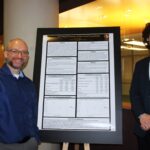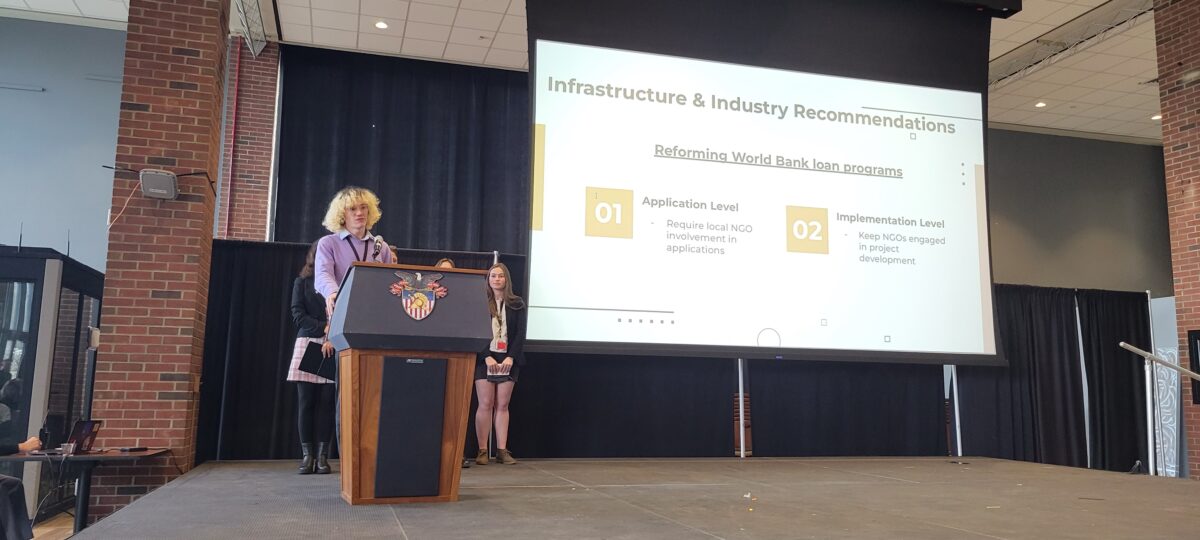
Peter Wilschke’s weeks leading up to graduation have been filled with unexpected excitement. His article “Political Drivers of State Fiscal Cyclicality” has been accepted for publication in the State and Local Government Review, the official journal of the Section on Intergovernmental Administration and Management of the American Society for Public Administration. The journal shares the latest research on state and local governments and the intergovernmental dimensions of public-sector activity.
“I’m exploring whether and how political factors—political polarization, turnover, and electoral competition—work to explain why some U.S. states tend to spend more in good times and less in bad times, unlike the federal government,” says Wilschke, who presented the paper at UMBC’s 2024 Undergraduate Research and Creative Achievement Day.
During a recent conference, editors of State and Local Government Review shared with Eric Stokan, associate professor of political science and Wilschke’s mentor, that the acceptance rate of articles is about 14 percent. “That’s for the entire field of scholars,” says Stokan. “Beyond being methodologically sophisticated, several at our Midwest Political Science Association conference also noted how truly important Peter’s work is for the field and practice.”
Pursuing a research idea
A couple of years ago Wilschke attended UMBC’s Center for Social Science Scholarship’s Mullen Lecture given by Carlos A. Vegh, the Fred H. Sanderson professor of international economics at Johns Hopkins University. Vegh discussed his research on how fiscal policy is conducted over the business cycle in both developing and developed countries. Wilschke wasn’t expecting the talk would set in motion a two-year research project. “It sparked an urge in me to find out more. I knew there was more to the story,” says Wilschke.
This was Wilschke’s first time leading a research project. “I didn’t quite know what I was getting myself into,” says Wilschke. He shared the idea with Carolyn Forestiere, professor of political science and his professor for research methods in political science, and she connected him with Stokan.
 Wilschke at the 2024 Student Conference on U.S. Affairs at the United States Military Academy in West Point, NY where students work with scholars and practitioners to develop proposals that address important topics in U.S. foreign policy. (Image courtesy of Wilschke)
Wilschke at the 2024 Student Conference on U.S. Affairs at the United States Military Academy in West Point, NY where students work with scholars and practitioners to develop proposals that address important topics in U.S. foreign policy. (Image courtesy of Wilschke)
Stokan says he enjoyed working with Wilschke weekly over two semesters to help him think through all aspects of the work. He taught Wilschke R, a programming language for statistical computing and data visualization. Stokan also suggested pieces of literature on the topic, which helped Wilschke think through the operationalization of his variables and analytic specifications, and framing policy. “Each session he would come back far ahead of where I thought he would be. I would consistently say, ‘Okay, your next step should be X,’ and he would have done X, Y, and Z,” says Stokan. “It was amazing. He learned R more quickly than anyone I have ever met.” Wilschke adds, “It was very helpful to have a mentor who had gone through this process multiple times before.”
After several drafts, Wilschke wanted to publish it in the Pi Sigma Alpha—the national political science honor society—undergraduate research journal. Stokan encouraged Wilschke to share the paper with Forestiere, the faculty advisor for Pi Sigma Alpha. “Eric and I encouraged Peter to submit it to a professional journal,” says Forestiere. “We figured that it would be a learning experience even if it was rejected.” They were all delighted when the journal asked Wilschke to revise and resubmit. “We were ecstatic when it was finally accepted for publication!”
Preparing for the unexpected
During the same time, Wilschke was interning at The Hilltop Institute at UMBC, a nonpartisan research organization at UMBC dedicated to improving the health and wellbeing of people and communities. He worked for Morgan Henderson, principal data scientist and affiliate professor of economics, and Morgane Mouslim, policy analyst, on a research project funded by the National Science Foundation on hospital pricing transparency. His two-year internship entailed helping to organize data collected from hundreds of hospitals and writing a news brief, “The Impact of Market Concentration on Hospital Pricing” and presenting it at URCAD 2024.
“Peter is an excellent researcher who helped our hospital price transparency project significantly over the past two years,” says Henderson. “The quality of his work is top-notch—we predict that he’ll go far.”
Wilschke did not plan on contributing empirical research to the field of political science as an undergraduate student. Looking back he is grateful for the classes and opportunities UMBC afforded him that prepared him to follow a hunch. Wilschke said that he felt that some students don’t look forward to statistical analysis or research methods classes in economics or political science because they’ve heard the classes can be difficult and may appear irrelevant at the moment.
“Once you take these courses, your world is kind of open to how empirical research is actually conducted in those fields. Without these classes I would not have known where to start,” says Wilschke. He advises students to approach empirical work as a combination of two things. “You have to care about your research question to push through all the time and hard work needed,” says Wilschke, “and put to work all the research skills you’ve learned to answer a question that needs to be answered, that policymakers can use to improve people’s lives.” This summer, Wilschke will work as a research assistant at the Federal Reserve Board of Governors in Washington, D.C.





